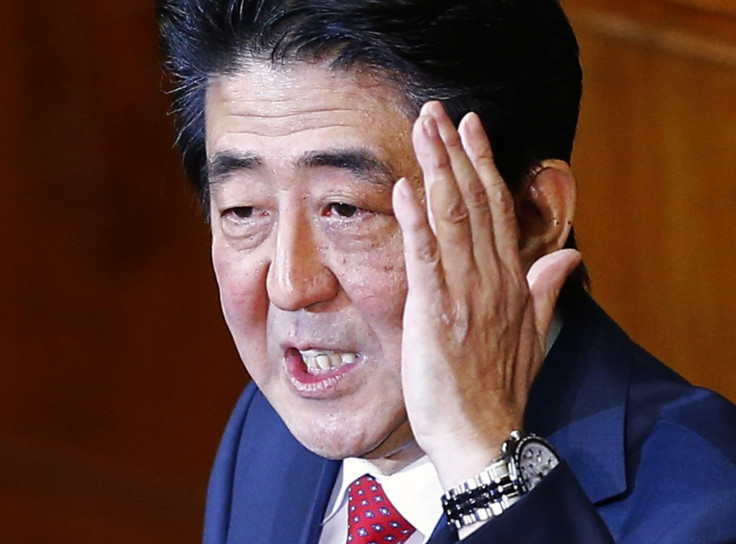Japan 'Unconvincingly' Exits Recession, But Abenomics Faces More Challenges In 2015

Asian stocks look set to open flat Tuesday a day after after the Nikkei 225, the leading index of Japanese stocks, hit an eight-year high after Japan edged its way out of recession. However, the world’s third largest economy still faces multiple challenges. Economists had hoped consumer spending would bounce back last quarter in the wake of April’s tax hike, but personal consumption was muted at the end of the year despite a massive drop in energy prices.
Although Japan exited recession at the end of last year, it did so “very unconvincingly,” according to Jonathan Buss, an economist at Oxford Economics. The Japanese government had been expecting domestic spending to come roaring back once the immediate fallout from last April’s tax hike had passed, but what economists are actually seeing in the latest GDP release is a remarkable degree of ongoing weakness in domestic spending. “That’s really what’s preventing the Japanese economy from growing faster than it is,” Buss said.
To combat two decades of deflation and stagnant economic growth, Japanese Prime Minister Shinzo Abe launched his three-pronged approach of structural reforms, better known as "Abenomics," at the start of his first term in 2006-07, which included new monetary, fiscal and structural policies.
After Japan fell into recession in the third quarter of 2014, economists concluded at least one element of Prime Minister Shinzo Abe’s recovery plan was ill-conceived: increasing the country's consumption tax from 5 percent to 8 percent last April. Economists say the sales tax hike weighed on consumer spending, which accounts for nearly 60 percent of Japan’s economy. Private consumption rose 0.3 percent in the fourth quarter, below economists’ forecasts for a 0.7 percent increase.
However, Japan’s growth last quarter was primarily driven by an increase in exports. The export sector is undoubtedly very important in Japan, accounting for nearly 20 percent of its total economy. A weaker yen also is beginning to have a positive effect on Japan’s export sector as shipments of electrical components used in hardware devices for U.S. multinational companies, such Apple Inc.’s iPhone, were particularly strong last quarter, said Bart van Ark, chief economist and chief strategy officer at The Conference Board.
“In the component sector, of course the low yen is going to help because it makes components cheaper, and that’s good for anyone that’s using Japanese components,” van Ark said.
But it’s difficult to see an upturn in exports being sustained at its current rate over the next few years, largely due to the slowdown in the Chinese economy. “Given that China is now Japan’s joint largest export market alongside the U.S., this is seriously going to weigh on foreign sales,” Buss said.
Global oil prices fell by nearly half of the value from June to the end of last year, which sent gasoline prices falling. Declining oil prices act similar to a tax cut by putting more money back into consumers’ pockets so they will go out and spend the money saved from energy bills, said Buss.
But there are possible risks to Japan’s economy from lower oil prices further down the line. “The main negative impact is on debt dynamics. Basically weak inflation raises the real burden of debt, which is a very serious problem in Japan given high debt levels, both in the public and private sector,” Buss warned.
In terms of outlook, Japan’s export sector is improving, and consumers should gain in the short term from lower oil, while Japan’s fiscal stance shifts to a more neutral direction. But what is really concerning is deflation, which could signal more monetary stimulus from the Bank of Japan in the form of quantitative easing later this year. “Given that the bid to decisively end deflation is really the key element of Abenomics, this is quite worrying because recent developments do threaten to throw this aspect of Abenomics off course,” Buss said.
Economists now expect inflation in Japan to dip back into negative territory in the middle of the year, mainly due to the drop in oil prices, but also slowing wage growth. “Countering a potential slide back into deflation in the near term is really the key challenge for Abenomics,” Buss said.
Japan edged out of recession last quarter after its gross domestic product, the broadest measure of goods and services produced across the economy, grew at an annualized rate of 2.2 percent, well below consensus forecasts. Economists had expected Japan’s GDP to expand at a 3.7 seasonally adjusted annual rate in the fourth quarter, according to analysts polled by Thomson Reuters.
“We’re not seeing major consumption effects and I think that’s really pushing us toward the longer-term perspective of if we do see a recovery, how is that going to translate itself into 2015,” said van Ark. “Because of that, we’re still fairly cautious about Japan’s economic growth this year.”
© Copyright IBTimes 2025. All rights reserved.






















